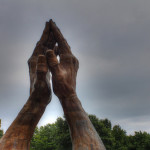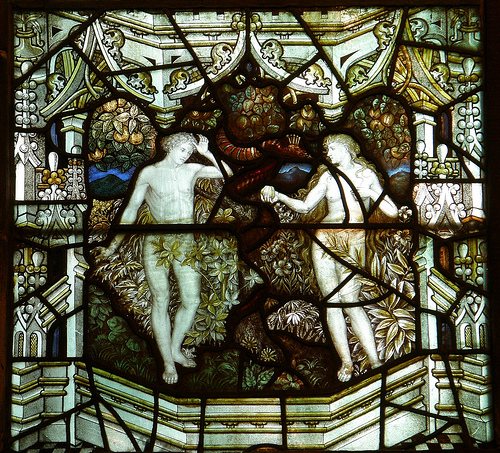We run our website the way we wished the whole internet worked: we provide high quality original content with no ads. We are funded solely by your direct support. Please consider supporting this project.
Judgment and Idolatry
Why was the forbidden tree in the center of the garden called The Tree of the Knowledge of Good and Evil? Since the Bible depicts eating from this tree as the reason humans are estranged from God and the cause of all that’s wrong with humanity, eating from this tree is obviously a terrible thing. But what’s so terrible about acquiring “knowledge of good and evil?” Why wouldn’t God want Adam and Eve to possess this knowledge?
The Hebrew concept of “knowledge” used here goes much deeper than mere intellectual knowledge. Rather, the concept of “the knowledge of good and evil” connotes an attempt by humans to define and experience good and evil on their own—apart from God. Eating from this tree represents a rebellion against God, for we are aspiring to be “wise like God” in the sense of grasping for moral autonomy—an exercise of sovereignty that is appropriate to God alone.
This is exactly what the serpent tempted Eve with. “[W]hen you eat of it,” he said, “your eyes will be opened, and you will be like God, knowing good and evil” (Gen 3:5). Eating from the forbidden tree represents our rebellious attempts to position ourselves as judges rather than leaving all judgment to God, as the bible consistently commands (e.g. Rom 14:10; James 4:11-12).
By eating from the forbidden tree, Eve was guilty of idolatry. Accepting the serpent’s false and untrustworthy depiction of God, Eve stopped trusting God to be her source of life and instead turned to the forbidden tree as a new source of life. This is idolatry.
Such idolatry causes us to define and experience as “good” all that gives us a sense of life. Conversely, everything that threatens our idolatrous sources of life is instinctively defined and experienced as “evil.” In other words, our idolatrous hunger unconsciously creates its own version of the Tree of the Knowledge of Good and Evil. We habitually see and experience the entire world through a filter of our self-serving judgments of good and evil.
The love that reflects the reign of God ascribes worth to others, at cost to oneself. In direct opposition to this, the judgment that reflects rebellion against God ascribes worth to oneself, at cost to others, and in rebellion against God’s own determination. Judgment, in other words, is the direct antithesis of agape love.
Put simply: We can’t possibly ascribe unsurpassable worth to others at cost to ourselves, while at the same time detracting worth from others to ascribe worth to ourselves.
Judgment is the antithesis of the kind of love that God always intended humans to receive and express to one another. It’s the antithesis of the kind of love that expresses God’s life and therefore the life of the kingdom.
I’m convinced this is why the Bible teaches that the Tree of the Knowledge of Good and Evil was placed in the center of the garden with the Tree of Life. Life as God intends it revolves around trusting God for his provision while obediently honoring God’s prohibition. This means we are to trust God’s provision of life while honoring God’s prohibition against judgment. And we cannot trust God’s provision of life while we participate in judgment.
The forbidden tree wasn’t some arbitrary test God put in the garden to tempt Adam and Eve. We should rather think of it as a sort of “No Trespassing” sign God lovingly gave to his first children. God was, in effect, teaching them—and us as well—that for life to be lived the way he intended it, for our life to manifest the beautiful kingdom of God, we must never think we can define and experience good and evil apart from him. When we try to do this, we are no longer trusting him for life and we immediately lose our capacity to receive his life and thus love like he loves.
The moment we become judgers, we stop being lovers. The moment we eat from the forbidden tree, we’re blocked from access to the Tree of Life (Gen 3:22-24).
Category: General
Tags: Adam and Eve, Idolatry, Judgment, Love, Tree of the Knowledge of Good and Evil
Topics: Following Jesus
Related Reading

Prayer and Co-Reigning with God
God’s primary objective is a world in which free agents love God and one another. For this to be possible, people need a stable environment and freely chosen, irrevocable, morally responsible say-so. Prayer is simply the spiritual side of our morally responsible say-so. We influence things by what we do through our bodies and in…

Why Are We So Mired in Violence?
In his marvelous little book entitled The Great Divorce, C. S. Lewis envisioned hell as a realm in which people are forever moving farther away from one another. Hell is the ultimate, cosmic, suburban sprawl! It seems to me that Western civilization is diving headlong into Lewis’ hell, and we’re being pulled there by the…

Tribalism
Sandra Unger spoke for Greg while he was on vacation the week after the 4th. In this clip, Sandra explains whats tribes are and how that creates unintended separation between people. In the full sermon, she speaks about what it means to be part of the Jesus Tribe. She discusses the reasons people are prone to…

What “God Loves You” Actually Means
From the beginning, God chose to have a people who would be the object of his eternal love, just as Christ is the object of his eternal love. God sought to acquire a “bride” for Christ who would receive and reflect the love of the triune community (Eph 5:25-32). And the only qualification for being…

Loving the Unlovable
Mother Teresa had a prayer she spoke each day that enabled her to minister effectively: Dearest Lord, may I see you today and every day in the person of your sick, and whilst nursing them, minister unto you. Though you hide yourself behind the unattractive disguise of the irritable, the exacting, the unreasonable, may I…

